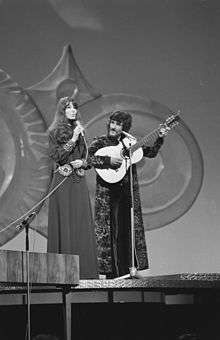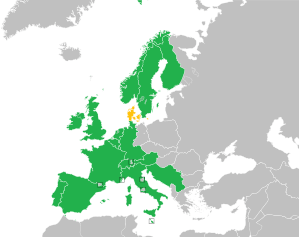Eurovision Song Contest 1971
The Eurovision Song Contest 1971 was the 16th edition of the annual Eurovision Song Contest. It took place in Dublin, Ireland, following Dana's win at the 1970 contest in Amsterdam, Netherlands with the song "All Kinds of Everything". It was the first time Ireland hosted the event. The contest was held at the Gaiety Theatre on Saturday 3 April 1971, and was hosted by Bernadette Ní Ghallchóir.
| Eurovision Song Contest 1971 | |
|---|---|
 | |
| Dates | |
| Final | 3 April 1971 |
| Host | |
| Venue | Gaiety Theatre Dublin, Ireland |
| Presenter(s) | Bernadette Ní Ghallchóir |
| Conductor | Colman Pearce |
| Directed by | Tom McGrath |
| Executive supervisor | Clifford Brown |
| Host broadcaster | Raidió Teilifís Éireann (RTÉ) |
| Interval act | Bunratty Castle Entertainers |
| Website | eurovision |
| Participants | |
| Number of entries | 18 |
| Debuting countries | |
| Returning countries | |
| Non-returning countries | None |
Participation map
| |
| Vote | |
| Voting system | Two-member juries (one aged 16 to 25 and the other 25 to 55) rated songs between one and five points. |
| Nul points | None |
| Winning song | "Un banc, un arbre, une rue" |
Eighteen countries participated in the contest, equalling the record of the 1965 and 1966 editions. Austria returned after their two-year absence, while Finland, Norway, Portugal and Sweden all returned after their one-year absence. Malta made their début in this edition.
The winner was Monaco with the song "Un banc, un arbre, une rue", performed by Séverine, written by Yves Dessca, and composed by Jean-Pierre Bourtayre. This was Monaco's first and only victory in the contest. The song was performed by a French singer, living in France, sung in French, conducted by a French native and written by a French team. Séverine later claimed she never visited Monaco before or after her victory – a claim easily disproved by the preview video submitted by Télé-Monte-Carlo featuring the singer on location in the Principality.[1]
Location
_(32615681881).jpg)
The contest was held at the Gaiety Theatre in Dublin, the capital and most populous city of Ireland.[2][3] This was the first time that the contest was held in Ireland.
Format
For the first time, each participating broadcaster was required to televise all the songs in "previews" prior to the live final. Belgium's preview video featured Nicole & Hugo performing the song "Goeiemorgen, morgen", but Nicole was struck with a sudden illness days before the contest final, with Jacques Raymond & Lily Castel stepping in at short notice to perform the entry in their place. Reports suggested that Castel had not even had enough time to buy a suitable dress for the show.
The BBC were worried about the possible audience reaction to the UK song due to the hostilities raging in Northern Ireland. They specifically selected a singer from Northern Ireland, Clodagh Rodgers, who was popular in both the UK and the Republic of Ireland, to ease any ill-feeling from the Dublin audience. However, Rodgers still received death threats from the IRA for representing the UK.
Groups of up to six people were allowed to perform for the first time, with the rule in previous contests of performing either solo or as a duet abolished.[4]
This was only RTÉ's second outside broadcast in colour. The contest was broadcast in Iceland, the United States and Hong Kong several days later.[5]
Voting system
A new voting system was introduced in this year's contest: each country sent two jury members, one aged over 25 and the other under 25 (with at least ten years' difference between their ages), with both awarding each country (except their own) a score of between one and five points.
While this meant that no country could score fewer than 34 points (and in the event all eighteen scored at least 52), it had one major problem: some jury members tended to award only one or two points. Whether this was done to increase their respective countries' chances of winning is not known for sure, but this shortcoming was nonetheless plain.[4] However, the system remained in place for the 1972 and 1973 contests.
Participating countries
Malta made their début in this year's contest, while Austria, Finland, Norway, Portugal and Sweden all returned after a brief absence. This brought the total number of countries to eighteen.
Conductors
Each performance had a conductor who directed the orchestra.[6][7]





.svg.png)



.svg.png)





.svg.png)


Returning artists
Two artists returned to the competition this year: Katja Ebstein represented Germany for the second consecutive year, while Jacques Raymond had previously represented Belgium in 1963.
Results
Scoreboard

| Results | |||||||||||||||||||||
|---|---|---|---|---|---|---|---|---|---|---|---|---|---|---|---|---|---|---|---|---|---|
| Austria | 66 | 3 | 5 | 2 | 7 | 2 | 3 | 2 | 3 | 3 | 6 | 4 | 6 | 3 | 5 | 4 | 3 | 5 | |||
| Malta | 52 | 4 | 2 | 2 | 3 | 5 | 3 | 2 | 3 | 4 | 4 | 2 | 4 | 5 | 2 | 2 | 3 | 2 | |||
| Monaco | 128 | 4 | 5 | 10 | 10 | 2 | 8 | 4 | 8 | 10 | 4 | 10 | 9 | 9 | 8 | 10 | 7 | 10 | |||
| Switzerland | 78 | 5 | 5 | 4 | 6 | 2 | 6 | 2 | 6 | 3 | 7 | 4 | 5 | 5 | 6 | 4 | 4 | 4 | |||
| Germany | 100 | 6 | 5 | 7 | 6 | 8 | 8 | 2 | 6 | 7 | 6 | 6 | 5 | 5 | 7 | 7 | 5 | 4 | |||
| Spain | 116 | 4 | 8 | 10 | 5 | 7 | 10 | 4 | 7 | 4 | 5 | 6 | 9 | 6 | 7 | 7 | 9 | 8 | |||
| France | 82 | 3 | 2 | 8 | 8 | 5 | 5 | 2 | 5 | 3 | 4 | 4 | 6 | 9 | 5 | 5 | 3 | 5 | |||
| Luxembourg | 70 | 2 | 7 | 6 | 3 | 2 | 4 | 5 | 6 | 3 | 3 | 2 | 5 | 3 | 6 | 4 | 5 | 4 | |||
| United Kingdom | 98 | 4 | 8 | 8 | 6 | 5 | 2 | 8 | 4 | 8 | 3 | 5 | 7 | 5 | 7 | 6 | 6 | 6 | |||
| Belgium | 68 | 3 | 2 | 5 | 4 | 2 | 2 | 5 | 2 | 6 | 3 | 5 | 4 | 6 | 6 | 3 | 6 | 4 | |||
| Italy | 91 | 4 | 6 | 9 | 8 | 6 | 6 | 9 | 2 | 6 | 2 | 7 | 6 | 2 | 3 | 8 | 2 | 5 | |||
| Sweden | 85 | 7 | 4 | 4 | 9 | 4 | 2 | 5 | 2 | 5 | 6 | 6 | 3 | 9 | 3 | 6 | 4 | 6 | |||
| Ireland | 79 | 7 | 6 | 6 | 3 | 4 | 5 | 7 | 2 | 6 | 3 | 6 | 2 | 5 | 4 | 5 | 4 | 4 | |||
| Netherlands | 85 | 6 | 2 | 6 | 5 | 4 | 5 | 7 | 2 | 5 | 2 | 2 | 6 | 5 | 9 | 5 | 6 | 8 | |||
| Portugal | 83 | 4 | 3 | 6 | 2 | 5 | 10 | 8 | 5 | 6 | 4 | 4 | 2 | 3 | 5 | 6 | 5 | 5 | |||
| Yugoslavia | 68 | 6 | 2 | 4 | 2 | 7 | 6 | 6 | 2 | 3 | 2 | 5 | 2 | 5 | 4 | 4 | 3 | 5 | |||
| Finland | 84 | 4 | 4 | 4 | 4 | 4 | 3 | 4 | 2 | 10 | 10 | 2 | 4 | 6 | 3 | 8 | 6 | 6 | |||
| Norway | 65 | 3 | 3 | 6 | 4 | 2 | 2 | 5 | 2 | 7 | 6 | 2 | 2 | 7 | 2 | 5 | 4 | 3 | |||
Broadcasters, commentators and jury members
Jury members
Listed below is the order in which votes were cast during the 1971 contest along with the names of the two jury members who voted for their respective country. Each country announced their results in groups of three.





.svg.png)



.svg.png)





.svg.png)


Broadcasters and commentators
Each national broadcaster also sent a commentator to the contest, in order to provide coverage of the contest in their own native language.
| Country | Broadcaster(s) | Commentator(s) | Ref(s) | |
|---|---|---|---|---|
| Participating countries | ||||
| FS1 | Ernst Grissemann | |||
| Hitradio Ö3 | Hubert Gaisbauer | |||
| RTB | French: Janine Lambotte | |||
| BRT | Dutch: Herman Verelst | |||
| RTB La Première | André Hagon | |||
| BRT Radio 1 | Nand Baert | |||
| YLE TV1 | Heikki Seppälä | |||
| Yleisohjelma | Matti Paalosmaa | |||
| Deuxième Chaîne ORTF | Georges de Caunes | [18] | ||
| France Inter | TBC | |||
| Deutsches Fernsehen | Hanns Verres | |||
| Deutschlandfunk/Bayern 2 | Wolf Mittler | |||
| RTÉ | Noel Andrews | |||
| RTÉ Radio | Kevin Roche | [19] | ||
| Programma Nazionale and Secondo Programma Radio |
Renato Tagliani | |||
| Télé-Luxembourg | Jacques Navadic | |||
| RTL | Camillo Felgen | |||
| MTV | Victor Aquilina | [9] | ||
| Télé Monte Carlo | Georges de Caunes | |||
| Nederland 1 | Pim Jacobs | [20] | ||
| NRK | Sverre Christophersen | |||
| NRK P1 | Erik Heyerdahl | |||
| I Programa | Henrique Mendes | [15] | ||
| Emissora Nacional Programa 1 | TBC | |||
| Primera Cadena | Joaquín Prat | |||
| Primer Programa RNE | Miguel de los Santos | |||
| SR TV1 | Åke Strömmer | [13] | ||
| SR P3 | Ursula Richter | [13] | ||
| TV DRS | German: Theodor Haller | |||
| TSR | French: Georges Hardy | |||
| TSI | Italian: Giovanni Bertini | |||
| BBC1 | Dave Lee Travis | [7][21] | ||
| BBC Radio 1 and BBC Radio 2 | Terry Wogan | [7][22] | ||
| BFBS Radio | John Russell | [7] | ||
| Televizija Beograd | Serbo-Croatian: Milovan Ilić | |||
| Televizija Zagreb | Serbo-Croatian: Oliver Mlakar | |||
| Televizija Ljubljana | Slovene: Tomaž Terček | |||
| Non-participating countries | ||||
| EIRT | Mako Georgiadou | |||
| Sjónvarpið | Unknown | |||
| PBS | No commentator | [7][23] | ||
References
- "Eurovision 1971 PREVIEW Monaco – SÉVERINE "Un Banc, Un Arbre, Une Rue"". YouTube. 8 August 2009. Retrieved 10 August 2012.
- "The Growth and Development of Dublin". Archived from the original (PDF) on 30 March 2013. Retrieved 30 December 2010.
- "Primate City Definition and Examples". Retrieved 21 October 2009.
- "Eurovision Song Contest 1971". European Broadcasting Union. Retrieved 2 January 2010.
- "Eurovision 1971 – Opening ceremony". YouTube. 7 July 2010. Retrieved 10 August 2012.
- "And the conductor is..." Retrieved 16 October 2013.
- Roxburgh, Gordon (2014). Songs for Europe: The United Kingdom at the Eurovision Song Contest. Volume Two: The 1970s. Prestatyn: Telos Publishing. pp. 51–64. ISBN 978-1-84583-093-9.
- "Eurovision Song Contest 1971". The Diggiloo Thrush. Retrieved 4 March 2012.
- "It was all in the game", Fred Barry, Times of Malta, 7 April 1971
- "1971 Eurovision Song Contest (German Commentary at 1h:14m:55s)". Retrieved 16 April 2020.
- "ESC 1971 - French comments (ORTF) 4:5".
- "Dubliner Jury bestochen?", Hamburger Abendblatt, 6 April 1971
- Thorsson, Leif (2006). Melodifestivalen genom tiderna ["Melodifestivalen through time"]. Stockholm: Premium Publishing AB. p. 88. ISBN 91-89136-29-2.
- Eriksen, Espen: "Vi tjener inn tapet på turisme", VG, page 13, 7 April 1971
- "A África também vai ver o Grande Prémio da Eurovisão", Diário de Lisboa, 3 April 1971
- Vladimir Pinzovski
- Zitting, Marianne (27 June 2010). "Muistathan: Eurovision laulukilpailu 1971" (in Finnish). Viisukuppila. Retrieved 10 August 2012.
- Masson, Christian. "1971 – Dublin" (in French). Songcontest.free.fr. Retrieved 10 August 2012.
- "RTÉ Stills Library". RTÉ Archives. Retrieved 10 August 2012.
- "Nederlandse televisiecommentatoren bij het Eurovisie Songfestival" (in Dutch). Eurovision Artists. Retrieved 1 June 2010.
- "Grand Final: 1971, Eurovision Song Contest". BBC.
- "Wogan quits Eurovision role". BBC News. 5 December 2008. Retrieved 22 August 2011.
- "Fanfare; 28; Eurovision Song Contest". Retrieved 13 July 2020 – via americanarchive.org.
Bibliography
- The Eurovision Song Contest: The Official History, John Kennedy O'Connor, Carlton Books Ltd, ISBN 1-84442-994-6

